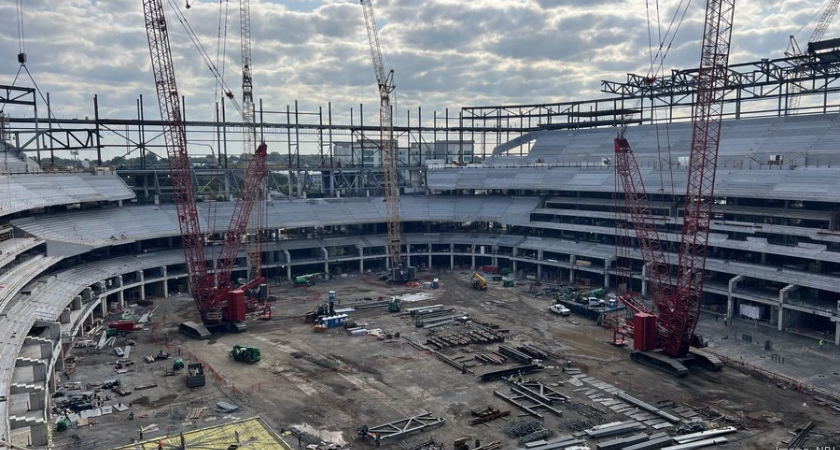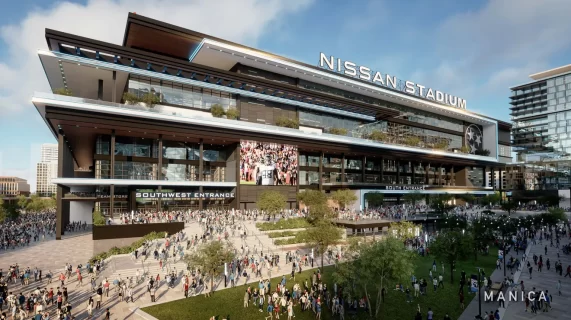
NASHVILLE, Tenn. — Construction of the new Nissan Stadium, the $2.1 billion future home of the Tennessee Titans, has hit a major milestone. Eighteen months into work, the stadium project has reached its halfway mark and remains on pace for February 2027 completion.

Work began in 2023, and according to officials, progress has been steady, with about 1,400 workers currently on-site daily.
Titans CEO Burke Nihill said the transformation is becoming more tangible with each passing week. “You can just feel everything in this stadium coming alive … it’s not renderings anymore. It’s real,” Nihill remarked.
In November 2025, workers will place the final vertical steel beams, marking the stadium’s structural completion.
The ETFE translucent canopy roof installation will begin afterward. About half of the steel framework for the roof is already in place on the west side, with cables soon to follow.
By fall 2026, the venue will be fully enclosed, allowing interior work like flooring, concessions, and seating to begin.
Installation began in September 2025, with nearly 200 units positioned, designed to flood the stadium with natural light.
The project is jointly funded through a $760 million contribution from Metro Nashville, $500 million from the State of Tennessee, and the remainder — plus any cost overruns — covered by the Titans.
The 60,000-seat facility will include:
Nihill emphasized the broader vision for the project: “I have always seen a way ahead. Everyone involved should end up in a place better than where they started when we embarked on this journey.”

The stadium is part of a much larger East Bank revitalization project. Spanning 300 acres along the riverfront, the redevelopment plan includes infrastructure improvements, hotels, and more than 1,500 housing units, with 700 designated as affordable housing.
At peak, the project will employ around 1,600 construction workers, pouring 98,000 cubic yards of concrete and delivering 18,000 tons of steel to the site.
Supporters believe the stadium will become a hub for entertainment and sports, positioning Nashville as a future host for a Super Bowl and other high-profile events. A tourism study estimated the stadium and surrounding development could add $33.7 billion to the local economy over 30 years.
Still, economists caution against overstating the benefits, arguing that stadiums often redirect spending rather than creating entirely new economic activity.
While the Titans will anchor the stadium with 10–12 home games per season, the venue is also planned to host Tennessee State University football games, concerts, conventions, and other large-scale events.
Its multipurpose design — featuring open plazas, walkways, and a wraparound deck with city views — is meant to make the stadium a year-round gathering space for both locals and visitors.
The current Nissan Stadium will remain in use through the 2026 NFL season, after which it will be phased out and eventually demolished. Engineers cited its open-air design and vulnerability to the elements as key reasons for its replacement after just 25 years.
Once the new stadium opens in 2027, it will not only serve as a premier NFL venue but also as a cornerstone of Nashville’s urban renewal, blending modern fan amenities with economic development ambitions.
Originally reported by Robert Barnes in Construction Review Online.